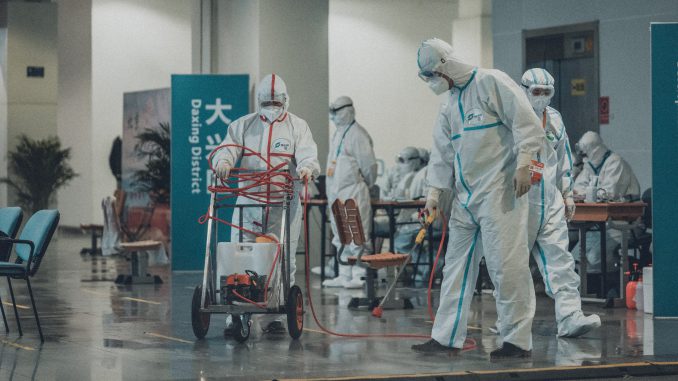
Following a number of urgent meetings between European leaders and the European Commission, it would appear there is still no common nor direct response to the current coronavirus outbreak.
Artículo disponible en Español | Article disponible en Français
European leaders and the European Commission have, so far, organized several urgent meetings to discuss the current coronavirus outbreak, as well as various measures to slow-down or stop this one. Sadly, it would appear EU leaders haven’t decided yet to apply a common and direct response to the current situation, putting a stop to the outbreak at once.
A clear indication that the European Commission doesn’t appear to be fully grasping the current situation is how this one is more worried about the general agenda of the Union rather than the outbreak. For instance, the Commission only recently started looking into the issue of near-empty or empty flights that are polluting the skies for nothing, with the aviation industry asking for rules to be temporarily relaxed, with airlines having to fly a certain number of flights from and to specific airports to keep their slots. At the same time, it is understandable the Union doesn’t see the urgency in this matter, with other, more pressing matters, such as the current refugee/immigration issues between the Turkish and Greek border, with Greek authorities struggling to cope with the sudden influx of migrants. EU authorities are not being very helpful on this matter either, with no real response against Ankara’s bullying tactics, leaving Greeks to cope with this situation on their own.
However, EU leaders have had weeks to observe and prepare for the outbreak, having been able to observe and learn from China’s handling of the crisis. Furthermore, this could have been Europe’s and EU citizens’ chance to show the world how a crisis must be handled, by taking China’s extreme and severely criticized measures, and apply them in a more respectful way in our continent. This way, with an early and coordinated response, the European Union could have avoided the desperate situation that Chinese authorities faced between November and the beginning of this month, March 2020, such as having to quarantine an entire province of their country or opening dozens of makeshift hospitals to treat the sudden influx of cases. Ironically, many initially criticized China’s way of handling this crisis, by claiming loudly and arrogantly that Western democracies could handle the situation much better than China’s “authoritarian” government. But, whichever way we look at it, and as we’ve covered in various previous articles, China’s extreme measures of extending their holidays, restricting the flow of travellers throughout the country and locking down the province of Hubei and its capital, the now well-known city of Wuhan, epicentre of the outbreak, have proven to be successful. Of course, this wouldn’t have been possible without the self-sacrifice and work of hundreds of Chinese doctors and nurses on the frontlines, who worked tirelessly to treat ill patients and take away the dead, and having, finally, managed to win the battle against the virus, saving thousands of lives and protecting the livelihoods of millions of Chinese citizens. Ultimately, and as many claim, both common citizens and we Europeans owe a great debt to these men and women who risked their lives for our common wellbeing.
If we now come back to Europe, the situation here is worsening by the day, to such an extent that we will soon be facing a worse outcome than what we’ve seen in Hubei. Authorities are, understandably enough, worried about entering a new financial crisis, or seeing their economies fall back into the recession we’ve barely exited, with all the financial measures of the European Central Bank already at their limits or exhausted. While it appears that there aren’t any alternatives to a lockdown, various self-centred citizens, especially in the United States, only think about themselves and are willing to put everybody else in danger, ignoring the common good, all in the name of money and the economy.
As mentioned, it is still not too late. The European Union must start by suspending all internal and external travel, limiting this one to the strict minimum and slowing down the overall economy for at least a few weeks. Governments and companies alike must also work together, pushing as many citizens as possible to work from home for a few weeks, regardless of the consequences in terms of productivity, and regardless of whether the employees’ job can be done from home or not. Those unable to work from home due to the nature of their occupation should be incited to stay at home, with employers facilitating this, making this sacrifice in the name of, once again, the common good. In this case, employers should resist the temptation of firing their employees during this period of time, and instead be there for them in these difficult times. At the same time, strict and severe measures should be placed and enforced at once, with all citizens staying at home for several weeks, and only going outside for restocking the bare essentials, as rarely as possible, and, if available in their area, choosing to have their grocery shopping delivered home by the supermarkets, rather than picking it up themselves and thus frequenting public places such as public transport or supermarkets, which could become hotspots for the coronavirus. Drivers in charge of these deliveries should also take the most extreme measures, by limiting any contact with the clients by, for example, leaving the grocery shopping in front of the customers’ door and just making sure they’ve delivered to the right person.
We are fully aware many will have a hard time understanding these extreme measures, and following them, due to being used to a high degree of liberty in our society, but these measures must be enforced by, for example, heavily fining offending citizens, or even threatening them with jail time, in case citizens repeatedly break these temporary rules.
Countries must also approach this situation with similar and common policies. Currently, each country is applying different measures, with, for example, Italy locking down mostly everything, Spain limiting visits to elderly people, or France restricting gatherings of over 1000 people. However, some countries are applying wildly different measures, such as Belgium, with each region having their own specific measures. As of right now, the Brussels region is the one applying the most severe measures, restricting any gatherings of more than 1000 people, prohibiting school trips outside of the country until Easter and banning visits to care homes. However, the other two Belgian regions have different rules, making these measures not only ineffective, but also confusing for citizens.
Collaboration-wise, the European Union is already ridiculing itself and being laughed at by others. For instance, Germany banned the export of specific medical gear (“personal protective equipment”, including masks, gloves and protective gowns), prioritizing their own doctors and population, instead of offering to export them to areas in need where they might be in short supply. Not only this, but European countries could have gone further in their cooperation efforts by, for example, dispatching medical or even military staff to aid the most affected regions of the continent. This current crisis must be approached as if we were all one big family, all united and working towards the same goal: winning this war, regardless of the financial impact. Money lost can be earned back, while lost lives will never return.
Money lost can be earned back, while lost lives will never return.
DRSC Media, 2020
Private companies can also play a role in the current situation. Chinese companies donated millions to help affected citizens, with key companies sending teams and resources to the most affected regions to help local authorities. Meanwhile, in Europe, there doesn’t appear to be any major company following this example and donating resources to local authorities, or even switching the production of their factories to products and equipment that are currently in short supply or might end up in scarcity, such as face masks.
Some companies have indeed stepped out and organized some kind of money collection, such as Google through their Google Play Store, with, according to the company, 100% of the proceeds going to the CDP, the “Center for Disaster Philanthropy”, an American company:
However, and in this specific case, Google’s action is not entirely without interests, with the corporation able to deduct the donated money from their taxes. Furthermore, the CDP appears to be an American organization that mostly distributes this money amongst American beneficiary organizations, meaning there’s little to no sense to advertise this option to European users, apart from stealing our money and funnelling it to a country that doesn’t need this money, depriving Europeans that could have benefited from these donations. Not only this, but most donors are likely average, middle-class European citizens that already barely make ends meet, and who thought it was a good cause to contribute to, without realizing that none of this money will actually help somebody near them. Some people might point out that, on the CDP’s website, we can find information that the organization supports various projects in Africa. Then again, it is important to point out that, not only is the European Union the world’s largest donor, with over 50 billion euro donated annually globally, but is also the largest donor to Africa. In other words, there is no need for regular European citizens to further donate to our Southern neighbours, and we should instead focus on helping Europeans in need.
Finally, and to finish with Google’s case, it is surprising that a corporation that made 162 billion USD in 2019 (we are talking about Alphabet here, Google’s parent company), with a net income of around 35 billion USD for the past year, is actually asking money from citizens, instead of footing the bill themselves, especially seeing their profits and the little to no taxes paid inside the European Union.
Coming back to the main subject of this article, and ignoring Google’s tasteless joke, it is still not too late for us, and for European leaders, to act and take drastic measures to curb the rapid spread of the coronavirus on our continent, and not only restrict its spread, but also show the world how a united continent can handle the situation, by the means of unity, cooperation and solidarity. However, time is running out: the sooner we act, the better, with every passing day resulting in hundreds, if not thousands, of extra cases and, ultimately, dozens of deaths.
More on this subject:
- “Wuhan virus”? How America’s elites are successfully controlling public opinion (10/03/2020)
- Chinese music group releases touching song against current fears and discrimination over coronavirus (28/02/2020)
- GSMA cancels the Mobile World Congress 2020 (12/02/2020)
- European Union stands with China in coronavirus outbreak, sends help (2/02/2020)




